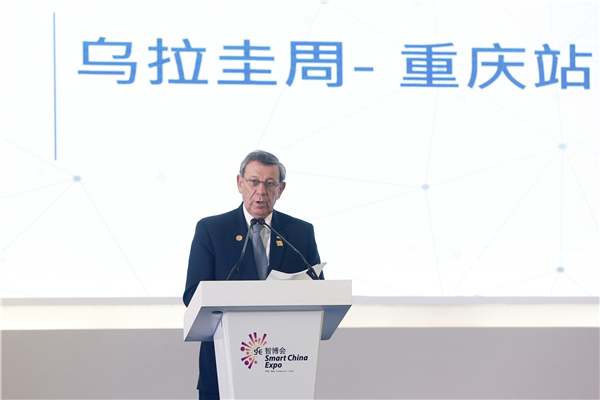Belt and Road Initiative 5 years on: Vigorous progress underway
- By Zhang Jiaqi
 0 Comment(s)
0 Comment(s) Print
Print E-mail China.org.cn, August 25, 2018
E-mail China.org.cn, August 25, 2018
When the 2018 Smart China Expo opened in Chongqing on Aug. 23, over 30 foreign politicians and high-ranking officials attended the event, working to extend bilateral cooperation in various fields in this critical city along the Belt and Road routes.

Uruguay in Latin America is one of the many countries that sought more cooperation opportunities at the event.
"We are surprised to see that Uruguayan goods and services exported to China are becoming increasingly diversified, and look forward to seeing this trend continue," said Rodolfo Nin Novoa, foreign minister of Uruguay, at a promotion event held on Aug. 23 during the expo.
He proposed that China and Uruguay can strengthen cooperation in various fields, including infrastructure, animal husbandry, logistics, design, information and communication technology, company service, education, tourism and even football.
This year marks the 30thanniversary of the establishment of diplomatic relations between China and Uruguay. And just days ago, the two countries also signed a memorandum of understanding on the Belt and Road Initiative (BRI) in Beijing.
According to Rodolfo Nin Novoa, China and Uruguay have maintained stable relations in the past 30 years, and all Uruguayan governments have recognized the strategic significance of China in the economic and social development of Uruguay.
He said that some Chongqing companies have set up shops in Uruguay, like Lifan Group, which assembles automobiles in San Jose, Uruguay.
Mou Gang, president of Lifan Group, said it is the only company in Uruguay that has its own plants for automobile assembly and engine building, which elevated the whole automobile industry of Uruguay.
According to him, the company exports motors and cars to over 120 countries and regions, and ranks among the top three in the export volume of China's automobiles. In Uruguay, the Lifan 620 car model is a star among local taxis with its sales volume accounting for 23 percent of the total sales volume of taxis in the Uruguayan capital.
"Due to the huge influence of Lifan, the locals can pronounce the Chinese phonetic alphabet 'li fan,' and even use it as 'hello' to greet others," Mou said.
Highlighting that Uruguay is an extraordinary logistics point for the BRI, and an important and secure platform for Chinese companies to enter Latin American markets, the minister said he believes more Chinese companies will settle down in Uruguay.
"Right now, and in the future, Uruguay and China have endless potential to complement each other's advantages, which will help to effectively upgrade bilateral ties," he added.





